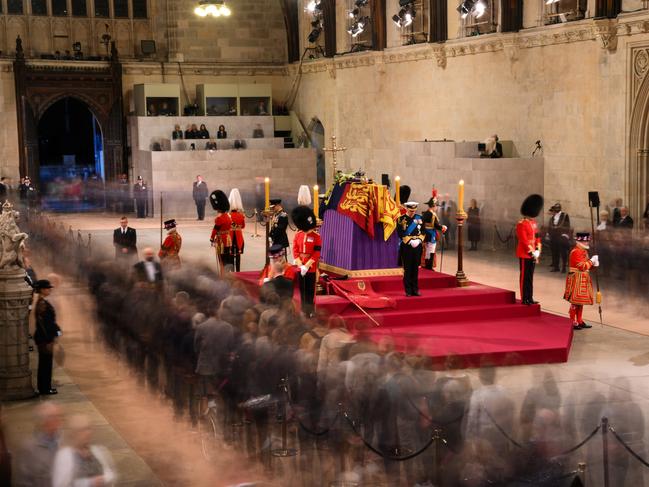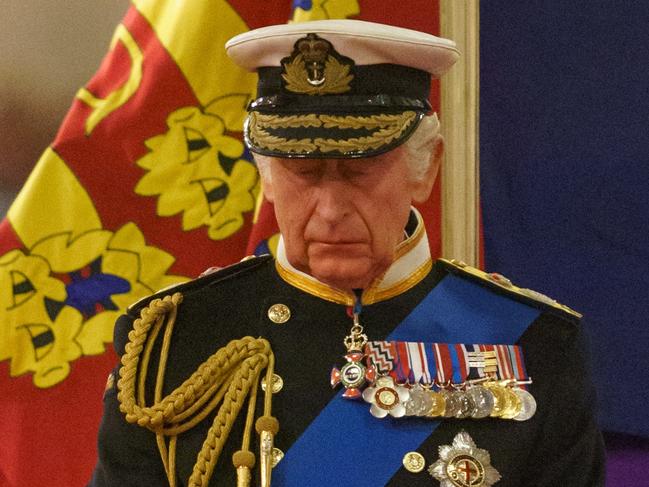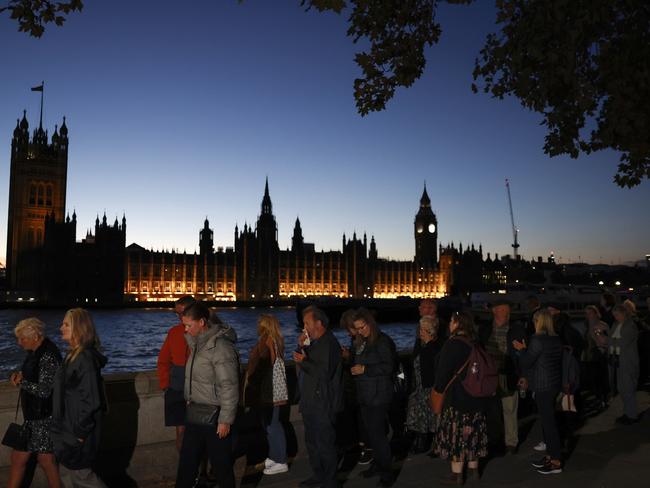Peta Credlin: Outpouring of emotion and grief symbolises what the monarchy means across the world
No matter how great their virtues, prime ministers and president can’t match people’s affection and connection with a decent and dedicated monarch serving for life, writes Peta Credlin.
Opinion
Don't miss out on the headlines from Opinion. Followed categories will be added to My News.
Ever since their defeat in the 1999 referendum, Australian republicans have said that the time to have another go would be after Queen Elizabeth’s death.
There’s no doubt that our late Queen was a totemic figure – as the bids to have her formally remembered as “Elizabeth the Great” or “Elizabeth the Faithful” attest. And there’s equally no doubt that the vast numbers paying personal tribute are likely moved more by her exemplary life than by the office she held.
Still, the extraordinary pageantry of the procession down the Royal Mile in Edinburgh and then from the Palace to Westminster Hall; the ritual involved in the Accession Council and the subsequent proclamation; coupled with the next sovereign’s ceremonial trips to the parliaments of all the countries of the United Kingdom, have touched deep chords of reverence and awe.
Republicans in Australia want to tell you the crowds are just cloying old royalists but they couldn’t be more wrong. I am here in London, and as I’ve moved around the capital over the past week or so, all ages and backgrounds make up those that quietly line the streets, to bow their heads, and to offer respect.

“Thank you”, is what most of them tell me they’re here to say; nothing more elaborate than that, just to record their gratitude for someone “who has always been there” and “served us”. A woman of immense privilege who touches a deep and reverent chord with ordinary people is what most republicans and critics fail to understand.
The rituals of the old Soviet Union and of present-day China involve immense and intimidating displays of deadly weaponry.
By contrast, those of our thousand-year-old monarchy marry history, faith and continuity and have given untold numbers a chance to be involved: watching processions, filing past the body, laying flowers at places associated with the Queen, or signing condolence books around the world.
She was Britain’s Queen; she was Australia’s Queen; but she was really the world’s Queen because there is nothing like the British monarchy and no one else like her.
Far from being a servile and an anachronistic attachment to inherited privilege, this vast collective pause to remember a mighty woman is a recognition that there is so much that matters beyond the merely present and the useful. I know I’ve found myself welling up numerous times over the past week: listening to stories of the Queen’s life, hearing the expressions of appreciation from people who couldn’t have known her but sensed her goodness, and watching the sombre ceremonies combining grief with gratitude.
For many, I suspect, at least subliminally, it’s been a time to turn from shallow and selfish concerns and to savour the qualities of character that make a life great.
It goes without saying that no republican leader could evoke such affection and respect. No matter how great their virtues, prime ministers and presidents who might serve for a term or two can’t match people’s familiarity and connectedness with a decent and dedicated monarch serving for life.

Although King Charles will never attain his mother’s platinum jubilee, as heir-to-the-throne he’s been a presence in our public life at least since his time as a junior housemaster at Timbertop in Geelong during the mid 1960s. His charitable works span five decades and many countries. And in pledging this week to desist from issues of activism and to reign as a scrupulously constitutional king, he’s shown how much he wants to be his mother’s son.
Amid all the deserved tributes to the Queen’s character, including from many who are instinctive republicans, it’s worth considering whether another system could produce someone like her. A monarch doesn’t seek the job. It comes by birth. Hence the monarch isn’t driven by the ambition that normally motivates office holders; nor chosen as a result of a partisan contest or preference.
Had her father not unexpectedly assumed the throne on the abdication of his brother, the Queen most likely would have spent her life as a country woman, dedicated to her children and animals. As a 10-year-old, she is said to have prayed for a baby brother so the throne might pass her by. Of how many leaders, could that be said – that they wished they didn’t have great power? And, during an apprenticeship that he must have feared would never end, Charles dedicated himself to good works, especially to preserving ancient crafts and beautiful buildings.
Again, amid all the eager thrusters in our public life, of how many could this be said? Monarchy aside, what system is ever likely to put at its apex someone who is an understated servant-leader? As the past week has shown, paradoxically, a hereditary system might actually be best for producing a head of state that the anonymous, decent people who make the world work can relate to.

And of course, in our local monarchy, to represent the Crown and to perform its constitutionally prescribed duties, we have governors-general and state governors.
Again, the kind of person who’s appointed governor-general is normally very different to the kind of person who typically emerges through a political process.
Former opposition leader Bill Shorten was one of a number of prominent republicans to write perceptively about the Queen this week. She provided “continuity and certainty in a changing world” he said; she showed “selflessness, calm, stoicism, and unflagging commitment to public duty”, he said; before aptly concluding: “history salutes strong leaders who accumulate power but leaders who disperse power are infinitely rarer”.
But that’s the point. It’s the institution that made this splendid individual, as much as the other way round. It’s more than possible to cherish the republican ideals – liberty, equality, fraternity – while appreciating that these might best be realised under a constitutional monarchy where authority keeps its distance from power.
The lawyer in me has always understood that the Crown is bigger than any individual who wears it. We are never without a sovereign, as we witnessed when the Crown passed seamlessly from mother to son. I hope that watching this continuity and stability might cause more of us to better appreciate, and prize, what we have.
Will that stop the republicans?
No, it won’t. Indeed, before she has even been buried, that’s been the push from our ABC, the Greens and vile characters on social media but their ignorance has been telling. After all, in denouncing the Queen as a “colonialist”, they forget she almost single-handedly turned an empire into a multiracial Commonwealth.
WATCH PETA ON CREDLIN ON SKY NEWS, WEEKNIGHTS AT 6PM





